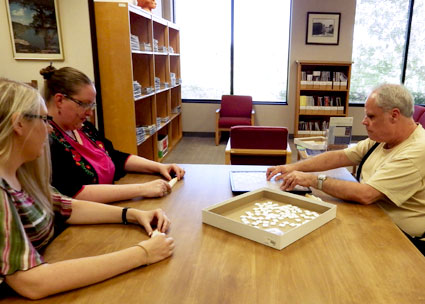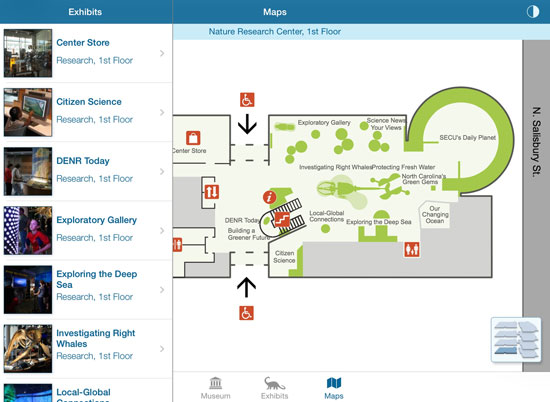 |
Library Grantee: Wolfner Talking Book and Braille Library Contact: Dr. Donna L. Riegel |
Museum Grantee: North Carolina Museum of Natural Sciences Contact: Liani Yirka |
Pictured above: Wolfner employees Lisa Peters, Marsha Posz, and Don Branch, who is also a Wolfner patron, play Scrabble in the library. The Wolfner Talking Book and Braille Library offers accessible board games to youth and adults.
Making Materials and Services Accessible to All Patrons
|
Libraries for the blind were established by the U.S. Congress through the Pratt-Smoot Act of 1931. This act provided an entity within the Library of Congress to handle special format materials for blind adults. Over the years, the law has been amended to include children with vision problems, persons with physical impairments which affect reading and persons with reading disabilities caused by a physical dysfunction. Approximately ten percent of all LSTA Grants to States funding is spent on these projects in the U.S. |
This July marks the 25th anniversary of the Americans with Disabilities Act (ADA), which granted civil rights protections to individuals with disabilities to assure equal opportunity for access to public accommodations. The law aimed to help alleviate the illiteracy, economic inequity, cultural isolation, and discrimination in education, employment, and the broad range of societal activities that individuals with disabilities often face.
The nation's museums, libraries, and archives play a critical role in closing these gaps by making their programs and facilities as broadly accessible as possible. One of the library champions promoting accessibility and maximum inclusion for the visually impaired is the Wolfner Talking Book and Braille Library in Jefferson City, Missouri. Wolfner Library is a member of the National Library Service (NLS) of the Library of Congress, a national network of cooperating libraries that provide free library service to those unable to read standard print materials due to blindness, visual or physical impairment, or a reading disability.
"I've seen a lot of enthusiasm in the field," says Dr. Donna L. Riegel of Wolfner Talking Book and Braille Library, referring to library professionals in the state of Missouri who are eager to expand services to help visually impaired patrons.
"As a librarian, it means we are able to maximize the utility of our collections and expand their use among visually handicapped individuals," she adds. "Access to these resources improves their quality of life, assists them in getting work, and helps them interact with the world."
The library provides Missourians informational and recreational materials in Braille and audio formats, free of charge. Materials are mailed, postage paid, to and from library patrons at their homes. Currently, more than 11,000 Missourians actively use Wolfner Library.
Supported by IMLS Grants to States funding, Wolfner Library has begun expanding programs to reach the maximum number of potential patrons in the state. The library introduced accessible games to youth and adults, including Rummy, Monopoly, and Uno with kits for Braille readers. The staff is in the process of launching an awareness project using stickers to inform public library borrowers of large-print books that they can use the services of Wolfner Library.
Wolfner Library participates in the Collaborative Summer Library Program (CSLP), a national consortia of public libraries that use the same summer theme. The CSLP creates a binder for the summer program that includes titles pertinent to that year's theme. This year, with the help of the Wolfner Children's Librarian, Lisa Peters, the manual will include information indicating accessibility of titles in formats usable by the visually impaired, permitting visually impaired children to participate on equal footing with all other children.
The library's duplication department downloads hundreds of titles from the Braille and Audio Reading Download (BARD) website, a national program provided by the National Library Service. Patrons may download material directly through their computer. For those who do not have access to a computer (or don't feel comfortable using a computer) Wolfner Library will make copies.
Providing Enhanced an Experience for All Visitors
While libraries like Wolfner are making essential materials accessible, museums in the U.S. are also making their exhibits and interactive experiences more inclusive to audiences with disabilities. With a Sparks! Ignition Grant for Museums from IMLS, the North Carolina Museum of Natural Sciences created a fully-accessible iOS mobile app to provide an enhanced experience for all visitors, including those who are blind or visually impaired.
The museum continually strives to serve the full community, regardless of physical barriers. The goal of the app was to improve visitor experience and allow for focused pre-planning for individuals with visual impairments by providing audio feedback through map features, which supports the development of "mental maps" of the museum. The updated experience allows for a more robust experience for visually impaired that is comparable to that of sighted visitors.
 "Personally, I wanted it to provide an equal footing, with no hindrances based on socioeconomic status. If visitors don't have their own smartphone or tablet devices, we have ones to loan," said Liani Yirka, the museum's accessibility & inclusion coordinator. "People who have different abilities and learning styles can use this app. It also bridges learning for people with autism or hearing impairment to experience the facility in different ways, but get equal information to those that don't have a disability."
"Personally, I wanted it to provide an equal footing, with no hindrances based on socioeconomic status. If visitors don't have their own smartphone or tablet devices, we have ones to loan," said Liani Yirka, the museum's accessibility & inclusion coordinator. "People who have different abilities and learning styles can use this app. It also bridges learning for people with autism or hearing impairment to experience the facility in different ways, but get equal information to those that don't have a disability."
With developers from the SAS Institute, Inc., the museum designed the app with a voiceover feature where the devices reads notes on the screen when correlating target areas on the map are touched with a finger. Visitors can touch the map to find where key points are, such as elevators, certain exhibits, information desks, or even restricted access areas. The app includes all of the museum's exhibits, with accompanying descriptions, audio files, photos, and videos.
The team also integrated a high contrast feature so someone with low vision can choose black and white over color, or zoom for large, high-resolution text. For the hearing impaired, the app includes captions for all videos, and audio descriptions converted into pictures.
Yirka notes that when testing the app with users of varying degrees of visual impairments, participants overwhelmingly agreed that the app would be helpful to them outside of the museum. Patrons expressed interest in seeing this functionality in grocery stores, malls, and airports to help them navigate. "This kind of technology is where a lot of the world should be going to make life more accessible," she said. "It's fun to be on the leading edge of that."
Ensuring Opportunities for all Abilities and Ages
Wolfner Library continues to expand its efforts to serve as many people in Missouri as it can. Staff members attend conferences, reach out to ophthalmology groups and senior centers, and continue to develop innovative ways to spread the word about the library's services.
Since its launch, the North Carolina Museum of Natural Sciences' app has been downloaded over 1,260 times by users around the world, and was recognized by the City of Raleigh Mayor's Committee for Persons with Disabilities with the Ken Franklin Citizen Involvement award. Yirka has also talked with contacts at local government agencies, state parks, zoos, and aquariums that are interested in creating apps with similar accessibility features.
End users are heavily invested in these programs. Bowman Rudolph, a Wolfner Library patron, describes the facility as "my bright light in my time of darkness." Riegel shares that she knows at least five active users of Wolfner Library who are over 100 years old. "Access to these materials improves their quality of life," she says.
Yirka also recognizes the importance of accessibility as individuals start losing some of their abilities with age. "I want someone to be thinking about how to provide services for me down the line," she says. With continued efforts to provide learning opportunities for all, she adds that she sees a lot of hope—for herself and the community at large.